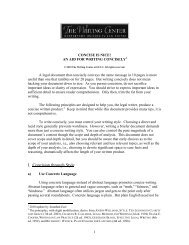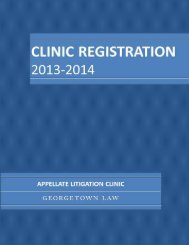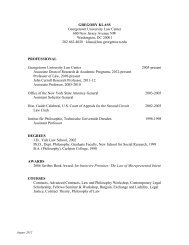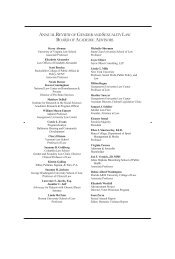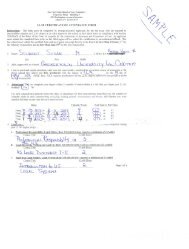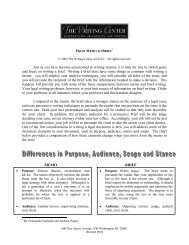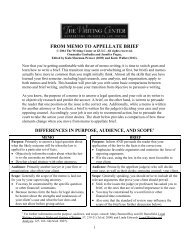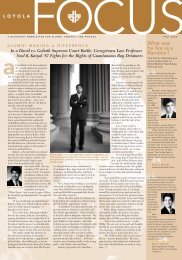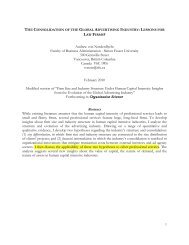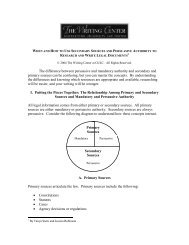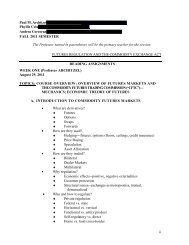Date: April 12, 2013 Topic: The Shrinking ... - Georgetown Law
Date: April 12, 2013 Topic: The Shrinking ... - Georgetown Law
Date: April 12, 2013 Topic: The Shrinking ... - Georgetown Law
You also want an ePaper? Increase the reach of your titles
YUMPU automatically turns print PDFs into web optimized ePapers that Google loves.
Before turning to our main quantitative analysis, we provide some qualitative background<br />
on the reactions and experiences of lawyers during KMS implementation, based on interviews<br />
conducted from 2005 to 2010.<br />
<strong>Law</strong>yers’ reactions to the knowledge management system<br />
When asked about their perceptions of the KMS and its use, some commented that it had<br />
positively influenced their working relationships, for example by helping people to discover<br />
more about the current projects of others who they were interested in for one reason or another.<br />
On the other hand, some people focused on the KMS as a source of information to be directly<br />
applied to projects. Some lawyers in this latter group focused on what they viewed as risks of<br />
KMS use, including the loss of intellectual independence, and the loss of human contact.<br />
Examples of these contrasted opinions are provided in the top panel of Table 1.<br />
On the specific issue of how KMS use could influence collaborative relationships,<br />
opinions were mixed. Consistent with the materialist view, some interviewees revealed the belief<br />
that using the KMS could effectively reduce the need for collaboration or interaction with peers,<br />
essentially substituting for workplace relations. Other interviewees made comments more<br />
consistent with the social view of technology, believing that they needed to draw on their<br />
existing relationships in order to use the KMS correctly. Still others agreed with the first group<br />
that KMS use reduced social interaction, but rather than viewing this positively they worried<br />
about how such changes would impact social relations or work quality. Examples of these<br />
diverse views are provided in the bottom panel of Table 1.<br />
THEORY AND HYPOTHESES<br />
<strong>The</strong> qualitative data above show contrasting reactions toward the KMS that loosely<br />
resemble the two widely subscribed perspectives on technology use we outlined above. In the<br />
materialist perspective, technology can substitute for interpersonal relationships in the execution<br />
of knowledge work and the creation of value; see for instance Braverman’s (1973) argument that<br />
technology deskills workers. In contrast, the social perspective argues that technology has<br />
limited independent effects (if any), unless one takes into account the social context of human<br />
agents and their interactions shaping the use of technology (Barley 1986; Orlikowski 2000; see<br />
Orlikowski and Barley 2001 for a review of these two views on technology).<br />
Although some theorization attempts have been made to bridge the gap between the old<br />
materialist perspective and the more recent social perspective of technology’s impacts, few<br />
studies have demonstrated how the two perspectives can be reconciled with empirical evidence.<br />
Haas and Hansen (2007) examine two types of knowledge sharing in line with the two<br />
perspectives: knowledge sharing in the form of electronic documents (technology use) versus in<br />
the form of personal advice (relying on relationships). <strong>The</strong>y find that different types of<br />
knowledge sharing do not substitute for each other. Extending Haas and Hansen (2007), we<br />
further examine how the two types of knowledge sharing, independently as well as conjointly,<br />
shape new tie formation and value creation in an organization.<br />
Technology use and relationship formation<br />
Focusing on the efficiency of technology in locating information and accessing<br />
knowledge, the materialist perspective emphasizes the benefits of KMS in making knowledge<br />
transparent and codified. Employees can gain new knowledge through KMS without having a<br />
<br />
4



